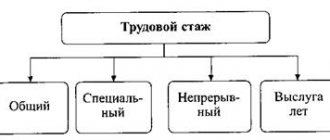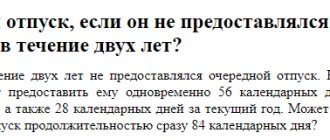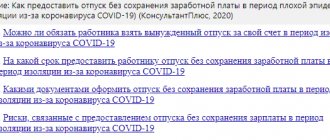Author of the article: Yulia Kaisina Last modified: January 2021 16746
When an employee is dismissed, he or she must be paid monetary compensation for unused vacation. Sometimes a person does not intend to leave the company, but due to financial problems or other reasons, he prefers not to go on vacation, but to receive money in return. Compensation for leave without dismissal is allowed, but a limited number of employees can count on it.
Main cases of payment
During work
When paying money for unused vacation days during the period the employee performs his labor functions. Some key points need to be observed:
- The initiative to compensate for part of the remaining vacation days in excess of the twenty-eight days established by law belongs entirely to the person performing labor functions. That is, without receiving an application from a direct employee to provide him with such funds, the employer cannot independently replace part of the rest time with a cash equivalent.
- Having received an application from his employee, the employer can either agree to provide this amount or refuse, due to production needs or other reasons.
It is worth noting that the legislation identifies a certain list of persons who are not allowed to replace part of the additional rest time provided to them with a cash payment, in particular, these include:
- pregnant women;
- minors;
- workers engaged in hazardous work;
- workers working in hazardous conditions.
In all of the above situations, payment of monetary compensation in exchange for rest days is not allowed, even at the personal request of the employee.
Upon dismissal
If we take into account the fact that vacation days must be provided to the employee annually, but there is no way to provide them to the dismissed employee, as a rule, cash is paid.
Annual leave must be provided to all employees, without exception, including those who work seasonally or part-time. Consequently, upon dismissal from any place of work, provided that the employee was officially employed, he is paid a certain amount of money for the rest time not provided.
If the working year has not been fully worked out, unclaimed vacation days must be paid in proportion to all months worked.
When dismissing an employee in the current calendar year who has already fully used his right to provide annual rest time in a given calendar year , the employer has every right to withhold from him part of the amount of payments for days not worked for vacation.
An employee can write a statement that he agrees to be dismissed after being granted annual vacation days, except in cases where the termination of employment is directly related to his guilty actions.
Rules for granting leave to employees
Each employer is obliged to draw up and comply with the sequence of granting annual paid leave to employees. As a rule, such a document is a vacation schedule. It must be completed 2 weeks before the new year.
and introduce it to the employees against signature.
If an employee wants to go on vacation on days other than those included in the vacation schedule, then the employer satisfies the stated request solely at its discretion.
Violations in scheduling
vacations may entail 2 types of sanctions:
- warning;
- imposition of an administrative fine.
A fine is imposed on officials and persons carrying out entrepreneurial activities without forming a legal entity in the amount of 1,000 to 5,000 rubles, on legal entities - from 30,000 to 50,000 rubles
.
Payment of vacation pay must be made no later than 3 calendar days before the start of the vacation. That is, there should be a gap of 3 days between payment and the first day of vacation. However, the legislation does not prohibit paying for vacations earlier than these dates.
If the employee was not paid vacation pay on time, then, according to Art. 124 of the Labor Code of the Russian Federation, the employer is obliged to postpone the vacation.
If the payment of vacation pay is delayed, the employer must transfer compensation to the employee
at a rate not lower than one three hundredth of the Bank of Russia refinancing rate for each day of delay from the entire amount of vacation pay. The refinancing rate must be set during the period of actual payment (currently the rate is 6.25%).
The right to use vacation for the first year of work arises for the employee after six months of continuous work with this employer. Leave may be granted earlier, but this is only possible by agreement of the parties.
Annual paid leave cannot be less than 28 calendar days
, but it may be longer. Holidays do not include holidays. If public holidays fall on the days of annual paid leave, the leave must be extended for the duration of these days.
Annual paid leave can be divided into parts by agreement of the parties. In this case, one of the parts of the vacation must be at least 14 calendar days.
For extended main leave
may apply:
- Workers under 18 years of age;
- Disabled people;
- Workers of child care institutions;
- Employees of educational institutions and teachers;
- Prosecutors, investigators of the prosecutor's office, customs officers, judges, employees of the Investigative Committee;
- Health workers;
- State and municipal employees;
- Candidates and doctors of science working in state-funded scientific institutions;
- Rescuers;
- Employees working with chemical weapons.
The employer has the right to independently approve leave for employees that exceeds 28 calendar days, securing such leave by local regulations.
Part-timers
Leave is granted in parallel with leave for the main job.
Categories of employees who are not allowed to replace unused vacation days with compensation
A certain list of employees is identified who are prohibited from replacing annual leave with monetary compensation. This category of persons includes:
- Pregnant women.
- Workers who have not reached the legal age of eighteen years.
- Workers performing their labor functions in enterprises with harmful and dangerous working conditions, if we are talking about their additional rest time.
However, such a restriction only exists if the employee requests compensation and does not resign from his or her job.
Otherwise, the employee is provided with all certain payments due upon termination of the contract, including for failure to provide the required vacation days.
Punishment for illegal compensation
If the procedure for replacing vacation with a financial accrual is violated (for example, recording days of standard vacation or paying an employee who is not entitled to it), the manager bears the punishment.
This is also important to know:
Bypass sheet upon dismissal: is it legal, sample, mandatory or not
The amount of the fine is determined by the status of the manager and in accordance with Part 1 of Art. 5.27 Code of Administrative Offenses of the Russian Federation, equals:
- 1-5 thousand rubles for officials (can be replaced by a warning);
- 1-5 thousand rubles for individual entrepreneurs without legal entity status;
- 30-50 thousand rubles for legal entities.
Repeated violation increases the amount of the penalty, which is:
- 10-20 thousand rubles for officials and individual entrepreneurs (in the first case, a monetary fine can be replaced by disqualification for 1-3 years);
- 50-70 thousand rubles for legal entities.
If you have problems obtaining compensation, you should contact a lawyer.
Procedure for calculating compensation for unused vacation
The procedure for providing the due payment for used vacation is quite simple.
- Initially, the manager , having carefully read the submitted application for dismissal or for replacing part of the worked vacation with cash, must issue an order to pay a monetary benefit for the vacation days unused by his colleague.
- Next, the accountant calculates the amount of compensation and calculates all required taxes from the amount received.
- Funds are transferred to the employee either on the last day of his performance of his labor functions, or together with a certain payment for his work for a specific calendar month. Splitting the payment of these funds over several months is not allowed - all compensation must be paid at once, in one amount.
How to correctly submit an application for compensation for unused vacation
An employee who wishes to receive a certain amount of money in lieu of unused vacation may have questions, in particular, regarding the application for such compensation. How to compose it? Are there any statutory requirements for the application?
Neither the Labor Code of the Russian Federation nor Russian legislation on accounting impose special requirements for an employee’s application. It is only important that such a statement be written in the name of the head of the organization. The rest, including the form and content of the application, can be anything at the discretion of the employee.
This is also important to know:
How does redundancy happen?
You can find a completed sample application for vacation compensation on our website.
Procedure for calculating compensation
When mentioning the procedure for calculating compensation for vacation days, it is assumed that the total number of days for which it is necessary to provide payment to the employee is determined, as well as the determination of his earnings received per day. To understand the calculation procedure, it is necessary to dwell on each of these concepts separately.
Average earnings
This is the average amount of income provided to an employee that was paid to that particular employee during a certain period of time. This indicator is very important and should be used not only when calculating the amount of the benefit due, but also, in particular, to determine the exact amount of transferred pension accruals.
Average earnings can be calculated if there are accruals:
- according to the tariff;
- according to salary;
- according to the deal.
It is worth noting separately that all payments that are not subject to income tax are not subject to participation in the calculation. This includes the following types of payments:
- funds received for sick leave;
- vacation pay provided;
- various financial assistance;
- benefits provided by the organization.
To calculate the total number of unused vacation days, just remember the rules of simple mathematics. If an employee is entitled to twenty-eight calendar vacation days for the full twelve months worked, then calculating the unused amount will not be difficult.
However, it is worth noting some peculiarities of such calculations:
- if an employee worked less than fifteen days in a month, this month is not taken into account in the calculation;
- if, accordingly, the employee worked more than fifteen days, the month is rounded up to the full month.
It is carried out by calculating the average salary for the last calendar year and the average daily earnings, which is determined by the formula: Average daily earnings = OT annual: 12:29.3
Accordingly, in order to calculate the due compensation for unused vacation days, it is necessary to calculate the amount of average earnings received per day and multiply it by the number of days remaining from the total rest time.
Procedure for registration and accrual
To apply for compensation for unpaid vacation, the employee must fill out an application addressed to the manager . The document is drawn up in free form, but it must contain some mandatory data:
- from whom and to whom the document is intended - this information is indicated in the upper right corner of the sheet;
- the word “Statement” is written in the middle of the page, and under it the purpose of writing is indicated - replacing vacation days with compensation;
- the text of the document should indicate the article confirming the right to receive payment (126 Labor Code), the period for which compensation may be due (as a rule, the last working year is indicated), the exact number of days remaining unpaid;
- At the bottom of the sheet is the applicant’s signature, its transcript and the current date.
After submitting the application, the manager must review it. Management can make either a positive or a negative decision - this right is reflected in the letter of the Russian Ministry of Labor No. 966-1 dated April 2002.
If an employee does not agree with the refusal to accrue payment, he can contact the Labor Inspectorate, which will conduct an inspection at the enterprise.
If the decision is positive, the manager issues an order , which must indicate the number of days for which the employee will receive payments.
This order is sent to the accounting department, where compensation is calculated according to a certain algorithm:
- the total amount earned by the employee during the working year is calculated, while payment for sick leave and rest days is not taken into account;
- the number of days of the pay period is calculated - if it is fully worked out, then the average number will be 29.6, and if during it the employee was absent from the workplace, these days are excluded from the calculation;
- the average daily wage is calculated - the calculated amount of earnings is divided by the number of days of the billing period;
- the resulting value is multiplied by the vacation days not taken off;
- the final number will be the monetary equivalent of the compensation due to the employee for unused vacation.
Compensation is usually accrued within ten days from the date of consideration of the application. If the company’s charter contains separate conditions regarding the transfer of payments to employees, you may have to wait for compensation until the day the wages are issued.
Other conditions apply to payments upon dismissal. Thus, compensation and other settlements with the employee are carried out on his last working day . If the employee was absent from the workplace on that day, then this procedure is postponed to the next working day.
Is compensation provided to a part-time worker for unused vacation?
Since the law provides for the need to provide an employee performing part-time job functions with an appropriate number of vacation days, he is therefore entitled to compensation for failure to use them.
Compensation for a part-time employee may be provided in the following cases:
- If the days for rest at the main place of work are fewer than in the organization in which he works part-time. In such a situation, the employer must reimburse him for the difference in unused days.
- When an employee is dismissed from a part-time job. At the same time, the need to provide compensation for unused days intended for the employee’s rest does not depend in any way on the reason for dismissal.
If a part-time worker took vacation in advance and quit before the end of the full calendar year, the employer has every right to withhold part of the paid vacation pay from him.
How to get cash coverage
As mentioned above, if an employee is not sure whether it is possible to replace the leave of monetary compensation in 2021, it is worth seeking clarification from the article of the law. The rule stipulates that compensation is paid only upon dismissal, for all required vacation days, or if non-core days are not used. To obtain it you need to do the following:
- Submit a free form application. If there is a special form - on the form. The header of the application indicates the position of the person who will endorse the application and his full name. Next, indicate the full name of the applicant.
- The name of the document is “statement”.
- The text itself is a request to replace vacation days with a cash equivalent. Indicate under what circumstances the additional leave was given, its duration and refer to Article 126 of the Labor Code of the Russian Federation on the right to receive compensation.
- Put the date and your own signature.
After 10 days or on the date of the next payment of wages accepted at the enterprise, the payment must be issued to the applicant. Basic leave cannot be replaced by compensation. This is a violation of the law and the guilty person is subject to administrative liability in the form of a large fine. The dilemma of whether it is possible to take compensation for unused vacation, if it is not the main one, without imposing penalties on the employer, suggests the answer: yes, it is possible.
Watch the video about vacation compensation before dismissal:
Upon dismissal, the employee is required to pay compensation for all days of vacation. If it was not provided within two years, then in two years.
If during the year of dismissal the employee managed to use part of the vacation, compensation will be less by the number of days used. It is subject to tax and insurance contributions according to established rules. Read more about the deduction of insurance premiums from compensation on our website https://otdelkadrov.online/7683-varianty-uderzhaniya-strahovyh-vznosov-s-kompensatsii-za-neispolzovannyi-otpusk
If an employee does not have the right to receive additional leave, then he does not have the right to compensation for vacation days, for example, unused for 2 years and, accordingly, doubled.
Features of taxation of compensation amount
- When making payments to an employee for unused rest days, the employer must independently calculate and pay a certain income tax. Based on the fact that the employee must receive all due payments on his last working day, his immediate superior must transfer all taxes to the budget until the actual payment of all amounts to his former employee.
- The due cash payment provided in lieu of days off from work exceeding the prescribed twenty-eight days must be paid upon the employee’s personal application and transferred to him along with his salary for the corresponding calendar month.
- Separately, it is worth focusing your attention on the fact that the amount of payments for unused rest days is not subject to insurance premiums. However, this only applies to the situation when an employee resigns from his place of work. If he continues to work in this organization, slightly different rules are provided. In particular, all these payments are subject to appropriate insurance contributions.
Is tax withheld from compensation?
The Tax Code, article number 210, determines that all income received by the taxpayer is taken into account when calculating the tax base.
Accordingly, compensation paid based on the employee’s application for basic leave is also subject to personal income tax in the prescribed manner.
The tax is withheld at the time of actual issuance of the payment in accordance with the text of Article 226 of the Tax Code. Due to the fact that compensation payments for vacation days not taken off are subject to personal income tax, therefore, an enterprise acting as a tax agent is obliged to reflect the withheld amount of tax in the reporting documentation - a certificate in Form 2-NDFL.
To designate compensation payments for unused vacation days, a specific code is used - 4800 “Other income” .
The nuances of compensation for unused vacations over several years
When an employee is dismissed, payment must be calculated for all unused calendar days for rest. Even if this particular employee performs his labor functions in the same organization for ten years and during this time never takes advantage of the opportunity to rest, all these days must be paid.
Separately, it is worth focusing your attention on several nuances, in particular:
- It is not necessary that the employee did not use his vacation days at all during all these years. For example, five years before his dismissal, he could rest three days less than he was entitled to. In such a situation, when an employee is dismissed, he must be paid appropriate compensation.
- Another nuance concerns the direct calculation of the compensation provided. In particular, everyone knows that every year wages are subject to indexation, therefore, when calculating payments for days not provided for rest, this must be taken into account. In order not to make mistakes in the calculations, it is necessary to carry out calculations individually for each individual year.
What to do if the employer does not pay the required funds?
If, on the date of termination of the parties’ employment relationship, the employee has days of unused vacation, the employer is obliged to:
- provide the employee with vacation with payment of vacation pay and subsequent dismissal at the end of the vacation;
- pay compensation for the remaining days.
If the employer does not fulfill these obligations, starting from the day of dismissal, the employee can file a complaint with the labor dispute commission, the labor inspectorate, or immediately go to court.
Where to go?
It is necessary to understand that despite the fact that the employee is no longer in an employment relationship with the employer, the disagreements that have arisen between them relate to individual labor disputes (Article 381 of the Labor Code of the Russian Federation).
The legislator provides various options for resolving individual labor disputes. List of places where an employee can go if vacation pay has not been received:
- with a statement of violations to the labor dispute commission, if there is one at the enterprise;
- with a statement of violations by the employer to the State Labor Inspectorate of your region;
- with a statement of claim to the judicial authorities.
Employees who go to court with demands for payment of wages and other payments arising from labor relations are exempt from paying state duty (clause 1 of part 1 of Article 333.36 of the Tax Code of the Russian Federation, Article 393 of the Labor Code of the Russian Federation).
Deadlines for applying for protection of your rights
To resolve an individual labor dispute that has arisen between a former employee and an employer related to non-payment of compensation for unused vacation upon dismissal, a person can contact the labor dispute commission.
The legislator has established a three-month period for such treatment, which begins from the moment the employee learned or should have learned that his rights were being violated. In this case, the period begins to be calculated from the day following the day of dismissal (Article 386 of the Labor Code of the Russian Federation).
Labor Code of the Russian Federation Article 386. Deadline for applying to the labor dispute commission
An employee may appeal to the labor dispute commission within three months from the day he learned or should have learned about a violation of his rights. If the established deadline is missed for valid reasons, the labor dispute commission may restore it and resolve the dispute on the merits.
There are no deadlines for filing an application with the State Labor Inspectorate at the legislative level, but it is in the interests of the employee to do this as early as possible. The labor inspectorate is obliged to consider the application within 30 days from the date of its receipt, and, if the facts stated in the application are confirmed, bring the employer to administrative responsibility.
Article 392 of the Labor Code of the Russian Federation gives the employee the right to go to court with claims for the collection of amounts unpaid upon dismissal within 1 year from the date of termination of the employment relationship.
If the deadline is missed for valid reasons, the court may decide to reinstate it. However, it should be borne in mind that established judicial practice does not always consider appealing to other supervisory authorities as such a valid reason.
Required documents
A former employee who decides to apply to the judicial authorities to claim compensation for unused vacation must provide the following documents:
- a copy of the employment contract;
- a copy of the dismissal order;
- a copy of the work book with a record of hiring and dismissal;
- salary certificate;
- documents confirming the settlement made upon termination of the parties’ legal relationship;
- calculation of the amount of compensation for vacation that has not been paid;
- a copy of the statement of claim for the defendant.
It is also advisable to collect documents confirming when the employee was paid wages and when vacation pay was paid. For example, these could be preserved payslips. You can bring a 2-NDFL certificate and obtain the testimony of colleagues.
Similar documents should be submitted when applying to the Labor Inspectorate.
If the former employee appealed to the supervisory authorities and, as a result of the inspection, the facts of violations were confirmed, copies of the appeals and responses to them can be attached to the lawsuit.
The employer will have to prove that the employee was actually on vacation. To do this, he will need to present to the court:
- leave orders signed by the employee;
- documents confirming payment of vacation pay.
If in fact there are no such documents, it will be difficult for the employer to prove his case.
Liability and penalties for violation of payment of compensation
It is necessary to pay attention to several legislative acts at once. As a result of the analysis, the following features can be identified:
- If for some reason an organization has not paid the due compensation for unused vacation, the labor inspectorate may hold it accountable under administrative law. In this case, the employee will have to pay the entire due amount of the debt. The amount of the administrative fine can reach up to fifty thousand, so you should think several times before deciding to leave your, albeit former, colleague without paying for his unprovided days for legal rest.
- Quite often there are situations when the direct employer has issued an appropriate order to pay funds for unused rest days, but the accountant, for some personal reason, did not make the payment. This can happen in many situations, from intentional delay to employee forgetfulness. In such a case, the employer can punish the offending accountant in the following way:
- fire;
- reprimand;
- make a remark.
- If the employer does not pay the amount due to his employee within the stipulated time frame, he falls under financial liability. This means that he will also have to provide this compensation in conjunction with additional interest established by law.
Possible exceptions
Management does not always have the right to replace vacation with cash payment. In Art. 126 of the Labor Code identifies certain categories of employees for whom financial accruals in lieu of unused vacation are not possible.
This is also important to know:
Under what article are people fired at their own request?
These include:
- women during pregnancy;
- citizens under 18 years of age;
- victims of the Chernobyl accident;
- citizens working in conditions classified as dangerous or harmful.
- The latter have the right to demand a monetary payment equal to a period exceeding the minimum additional rest (which is 7 days). This means that while receiving 12 days of annual paid leave, financial compensation is allowed only for 4 of them.
- During pregnancy, women cannot replace their prescribed rest days with monetary compensation, even at their own request. However, at the same time, they are entitled to leave at any time at their request, even before being released from work obligations to care for a child or immediately after returning to work after childbirth. This is their main privilege, which cannot be challenged without breaking the law.
The accrual of compensation for unused vacation without dismissal for the listed categories will become the basis for a monetary penalty from the manager who decided to meet them halfway.
note
The possibility of receiving a financial payment in lieu of vacation time is only relevant for each individual calendar year. Days of unused additional leave for different reporting periods are not summed up when determining the amount of payment.
Right to compensation
Each year, an employee can take a certain number of days to recuperate.
The citizen at the enterprise retains his workplace and his position. The manager, taking into account the average salary for the last year of the employee, is obliged to pay him for this period. A worker can take advantage of his opportunity to rest for the first time after six months of continuous work. And after eleven - get paid leave. It is issued to employees taking into account the established schedule.
The standard vacation period lasts 28 calendar days. There is a category of professions where a larger amount is allocated to it. In addition, additional rest time is provided for certain merits. A citizen can leave immediately for the entire legal period or take part of it, but not less than two weeks.
The Labor Code states that it is permissible to replace the vacation period with monetary compensation. This applies to the moment when an employee leaves the company.
At the request of the citizen, after drawing up an appropriate application before leaving, he can be given rest. The last working day coincides with the final vacation pay.
Interesting! A citizen leaving the company will not suffer financially, since there is only one system for calculating vacation pay and compensating vacation days upon dismissal.
Where does it come from?
For various reasons, a worker may not go on vacation. Then these days are postponed or the rest is extended if the employee:
- carried out assignments during the vacation period;
- had a disease and issued a sick leave certificate at a medical institution.
Legislative acts indicate a number of other possible cases.
A new date is set and the vacation is extended at the initiative of the organization’s management, but taking into account the employee’s opinion.
Important! When transferring vacation days, they must be used no later than next year.
If a production need arises, a person may be recalled from vacation with his consent. He can take it for a walk later, or he can add these days to the next rest period.
Read also: Calculation of advance payment in 2021
It is impossible, according to legal acts, to invite the following to perform their duties on vacation days:
- pregnant women;
- minor workers;
- hazardous workers.
The law prohibits not providing rest to employees for two years.
Calculation nuances
A general calculation scheme has been presented here, but difficulties may arise when determining the final value. One of them is that it is not clear what to do if a person has not worked for a full month. In this case, you must perform the following steps:
- The total number of working days in the desired month (OKD) is determined.
- It takes into account how much work was done (KRDN).
- A coefficient expressing their ratio is determined (COEF = (KRDN / OKD)).
- The conditional number of days in a month (29.3) is multiplied by the calculated coefficient.
The resulting number is considered as the number of calendar days for the corresponding month.
It is necessary to take into account which days should be included in the period under consideration. If a person worked for less than 12 months, then the time that began on the first day of his work and ended on the last day of the period under consideration is taken for calculation.
It is important to understand that not all time during the period under consideration can be taken into account. For example, if an employee was on sick leave, then it is considered that he was not working at that time.
Not all payments received are used in calculations. Salaries and additional payments related to the employee’s performance are taken into account. If we are talking about bonuses that are not directly related to the labor process, then they are not included in the consideration.
You need to understand how payments by date are taken into account. The period under review includes only those accrued in this period or directly related to it. An example of the latter is bonus payments for achieved results in work, which were related to the period under review, but were paid later.
A question arises that can be illustrated by the following example. Let the calculation consider the second half of 2019, and the bonus based on work results was awarded for the entire 2019. In order to take it into account correctly, it is necessary to proportionally highlight that part of it that relates to July-December 2021 and take it into account in the calculations.








